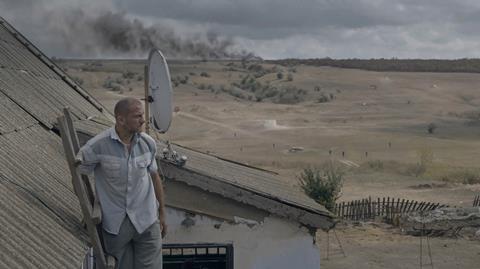Husband and wife clash in the wreckage on war-torn Ukrainian/Russian border

Dir/scr: Maryna Er Gorbach. Ukraine/Turkey. 2022. 100 mins.
The perception at the heart of Turkish-based Ukrainian director Maryna Er Gorbach’s absorbing second feature, set in the disputed Donbas region of eastern Ukraine, is that wars can be fought in more ways than one. The obvious route – a male speciality – is to pick sides and take up arms. But it’s also possible to fight war itself – to resist its swagger, its desire to terrorise and subjugate, its untidiness, its rhetoric. And this, Gorbach suggests, is something women do a lot better than men. Irka, the rural wife at the centre of Klondike, is defiantly and at times desperately at war with war.
Klondike is both despairing – sometimes in a blackly comic vein – and empathetic
Grounded in Oxana Cherkashyna’s utterly convincing performance as a heavily pregnant woman whose vulnerability becomes a kind of strength, Klondike begins on a day that most of us will remember: 17 July 2014, when Malaysian Airlines Flight 17 was shot down over Donbas with the loss of 298 passengers and crew. The plume of smoke from the main crash site is clearly visible from the farmhouse that Irka shares with her husband Tolik (Sergey Shadrin), and it’s a more immediate presence too, in the form of a piece of fuselage in the yard and something unmentionable by the woodshed.
Coupling a story that could have been set in pretty much any war zone anywhere to such a charged event is a gamble not entirely won by the writer-director, who can’t resist, for example, having Irka and Tolik sit down that same day to watch shocking TV news footage hinting at Russian involvement in the incident that in reality only emerged (via News Corp in Australia) a year later. A Dutch couple who turn up days later looking for their daughter feel like visitors from another planet – though perhaps this is part of the point. Yet at the same time there’s undeniable purchase and power in taking an event that shocked the world and turning it inside out. Klondike is both despairing – sometimes in a blackly comic vein – and empathetic in the way it sees the incident from the ground up rather than from the sky down.
Two ‘mistakes’ (a recurrent, loaded word in the film) underpin the action: the first is a mortar misfire that blows a hole in the side of Irka and Tolik’s house, the second the downing of the Malaysian jet. The mortar ‘accident’ is the work of local anti-Ukraine rebels allied with the Russians – a former friend of Tolik who has cast his lot in with the separatists admits as much when he calls around, not so much to apologise as to sheepishly wave some cookies at his erstwhile schoolmate and offer to rebuild the wall and roof.
With his tattoos, shaved head and bullish manner, Tolik looks like the ringleader of a prison riot but in fact he’s a conflicted softie, solicitous towards a wife that he wants to take somewhere “where there is no war”. Irka’s brother, the impetuous pro-Ukrainian Yaryk (Oleg Scherbina), also tries to railroad her into leaving. He views the fence-sitting Tolik as an out-and-out separatist, and in a way he’s right – being neutral in somewhere like Donbas, Gorbach suggests, is taking sides, at least if you adhere to male logic. Irka’s strategy is to clean and dust a living room that has a gaping hole in the wall, milk Maya the cow, pick and bottle the tomatoes, and make her passive resistance into something fierce, despite her fears.
The widescreen photography and washed-out colour palette Western-ises the undulating agricultural landscape around the couple’s home, which could easily have drifted here from Canada or the American midwest. (However, another implication of the film’s not entirely convincing title – that the mineral-rich Donbas is being fought over because of its natural resources – is not explored as a theme, it’s simply something we need to bring to the table). There’s a discourse going on here about perspective, about closeness and distance, that recalls that famous Pieter Bruegel painting of Landscape with the Fall of Icarus, where the winged mythological boy is depicted as a tiny speck falling into the sea as rural life goes on all around. Similarly, when a flatbed truck goes past carrying a rocket launcher very like the Russian one that is believed to have brought down Flight MH17, it’s a detail in the middle distance, viewed beyond a herd of goats.
Production companies: Kedr Film, Protim V.P.
International sales: TBC, contact mehmetbahadirer@gmail.com
Producers: Maryna Er Gorbach, Mehmet Bahadir Er, Sviatoslav Bulakovskyi
Editing: Maryna Er Gorbach
Production Design: Marketa Korinkova-Taplin
Cinematography: Sviatoslav Bulakovskyi
Music: Zviad Mgebry
Main cast: Oxana Cherkashyna, Sergey Shadrin, Oleg Scherbina, Oleg Shevchuk, Artur Aramyan, Evgenij Efremov















![[L-R]: Amanda Villavieja, Laia Casanovas, Yasmina Praderas](https://d1nslcd7m2225b.cloudfront.net/Pictures/274x183/6/4/1/1471641_pxl_20251224_103354743_618426_crop.jpg)








